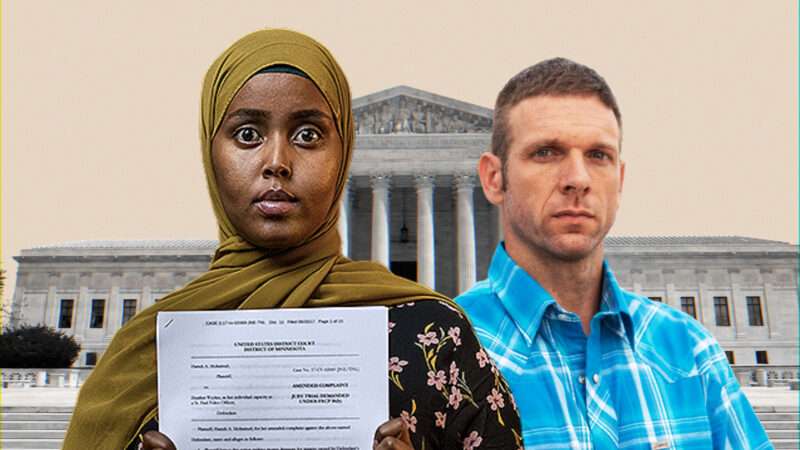
Reports that the U.S. Supreme Court is poised to overturn one of its major precedents recently gripped much of the country. Today, the high court effectively did just that.
Except it wasn't Roe v. Wade—the case that established a constitutional right to an abortion—that the justices declared null. It was a different early-1970s precedent with far-reaching implications for anyone who has their rights violated by federal government agents.
Going forward, such victims will essentially have no recourse against those rogue actors. A federal badge will now serve as an impenetrable shield against civil liability for violating the same laws agents are charged with upholding.
You'd be forgiven for having never heard of it, as these cases tend to cruise under the radar. But you'd really be forgiven this time, seeing as the Supreme Court partially opted to dismantle Bivens v. Six Unknown Named Agents of the Federal Bureau of Narcotics—its 1971 decision that allowed a man to sue federal officers who searched his home without a warrant and then strip-searched him at a courthouse—not by hearing a case and deciding on the merits but by refusing to do that.
The justices announced today—exactly 51 years after the Court handed down Bivens—that they would decline to consider two major petitions. In the first, St. Paul Police Department Officer Heather Weyker, who was serving on a federal task force, conjured a fake sex-trafficking ring and jailed a teenage girl for two years on trumped-up charges. In the second, Department of Homeland Security Agent Ray Lamb allegedly tried to kill a man who had a personal beef with Lamb's son; video appears to show Lamb attempting to pull the trigger of his gun, though it jammed.
Federal courts in both cases agreed with what may sound intuitive: Both Weyker and Lamb violated clearly established law. They are thus not protected by qualified immunity, the legal doctrine that can make it difficult to sue local and state actors when they violate the Constitution. But because they were working for the federal government, they are protected by absolute immunity, the courts said, and their victims—Hamdi Mohamud and Kevin Byrd, respectively—may not sue them for disgracing their positions.
"Today, on the 51st anniversary of Bivens, the Supreme Court overturned Bivens," says Anya Bidwell, an attorney at the Institute for Justice, the public interest law firm representing both Mohamud and Byrd. "They are not explicitly saying it, but they are effectively doing it."
The explicit part of that puzzle came two weeks back when the high court ruled that a Customs and Border Protection (CBP) officer—who allegedly assaulted the owner of a bed and breakfast and then sent the IRS after him for lodging a complaint—cannot be sued for violating the First and Fourth Amendments. This overturned a lower court decision that came to the opposite conclusion and etched in stone that immigration agents are, in some sense, above the law.
But neither Weyker nor Lamb were acting in a context that remotely resembled immigration enforcement. By demurring at hearing those cases, the Supreme Court has upheld the decisions giving both officers absolute immunity for committing transgressions while policing domestically. "Today's rulings are basically saying that you can never sue federal officials, period," notes Bidwell.
What's ironic, however, is that the U.S. government—which isn't exactly known for supporting accountability—admitted before the Supreme Court that there should be instances in which a victim can sue federal officers. More ironic is that Michael Huston, assistant to the solicitor general, made that argument during oral arguments for Egbert v. Boule, the case concerning the rogue CBP agent. Most ironic: The circumstances Huston outlined as the right and proper context to sue federal officials fit both Mohamud's and Byrd's petitions.
Chief Justice John Roberts: Mr. Huston, give me a hypothetical case where your office would say Bivens permits a cause of action.
Huston: Sure, Your Honor. In a case involving an FBI agent or an agent of the Park Police or the Marshals Service, something other than the Federal Bureau of Narcotics or its successor, the DEA, but that is a routine domestic search-and-seizure claim or a [sic] excessive force claim.
Yet the Supreme Court covertly declined to leave those vestiges behind after ravaging its own 1971 decision. "Overturning precedent is generally disfavored activity," adds Bidwell. "But when the Court does it, it should at least have the courage of its convictions and stand up and tell the public."
The post Supreme Court Makes It Effectively Impossible To Sue Federal Cops, Smashing a 51-Year-Old Precedent appeared first on Reason.com.







